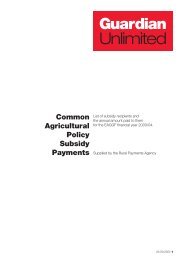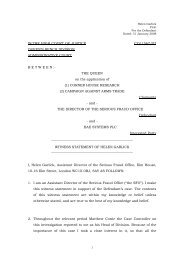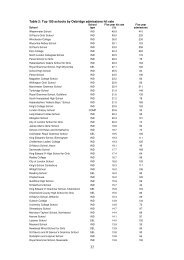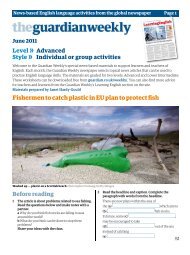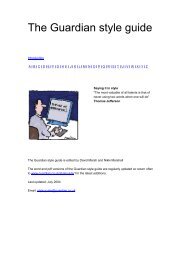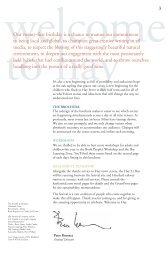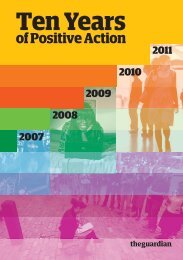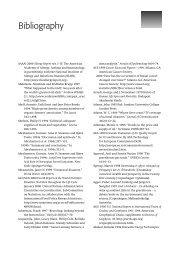KATINE COMMUNITY PARTNERSHIPS PROJECT - Guardian.co.uk
KATINE COMMUNITY PARTNERSHIPS PROJECT - Guardian.co.uk
KATINE COMMUNITY PARTNERSHIPS PROJECT - Guardian.co.uk
Create successful ePaper yourself
Turn your PDF publications into a flip-book with our unique Google optimized e-Paper software.
Ac<strong>co</strong>rding to the district re<strong>co</strong>rds, safe water <strong>co</strong>verage in Soroti district stands at 76%, which is<br />
in fact well over the national average of 65%. The functionality rate of the installed water<br />
facilities is at 89%. Results from the AMREF EU project survey done in 2007 indicate that<br />
latrine <strong>co</strong>verage is at 68%, also above the national average of 65%. Ac<strong>co</strong>rding to the District<br />
health inspectorate however, the biggest challenge is the lack of budget support to the<br />
Environmental Health Division for Sanitation Promotion, emphasising the need for a financial<br />
lobbying strategy.<br />
As much as the government has strengthened decentralisation in Uganda - with the sub<strong>co</strong>unty<br />
as the lowest unit of development planning and implementation - this has almost<br />
exclusively emphasised the supply side of governance. Citizens have remained passive to<br />
events and public decisions that affect them. The need for citizens to actively engage in public<br />
decision making on matters that affect them and demand for their rights is imperative.<br />
Ac<strong>co</strong>rding to district reports, there is low <strong>co</strong>mmunity participation in local government planning<br />
and implementation in Soroti. Therefore there is a pressing need to empower <strong>co</strong>mmunities to<br />
effectively engage in local governance issues across sectors. This is so important because<br />
only 68% of the population are literate, 48% of households own a radio and 49% of the<br />
population depend on word of mouth to get information (UBOS, 2002 Census report).<br />
1.3 Development Context in Katine sub-<strong>co</strong>unty<br />
Katine sub-<strong>co</strong>unty is part of Soroti district. It has one of the worst re<strong>co</strong>rds for poverty and<br />
underdevelopment among the 17 sub-<strong>co</strong>unties and 3 municipality divisions in the district. A<br />
<strong>co</strong>mparison of Katine indicators with that from the 2006 Uganda Demographic and Health<br />
Survey shows that overall baseline <strong>co</strong>nditions for the Katine population are worse than the<br />
average for rural areas of the <strong>co</strong>untry.<br />
In light of this, the KCPP strives to improve the quality of life of the estimated 25,000 people in<br />
Katine. The project’s integrated approach will simultaneously address various project<br />
<strong>co</strong>mponents of better health, access to education, access to safe water, increased in<strong>co</strong>mes<br />
and active citizen participation for decision making in local governance.<br />
2.0 PROBLEM ANALYSIS<br />
When AMREF addressed project priorities with the sub-<strong>co</strong>unty and district leaders, needs<br />
were identified in the areas of health, education, water and sanitation, livelihoods and<br />
<strong>co</strong>mmunity empowerment.<br />
A household survey was <strong>co</strong>nducted by AMREF in January 2008 to assess the needs further<br />
whereby the results of the survey demonstrated that the overall baseline in Katine sub-<strong>co</strong>unty<br />
were uniformly poor 6 . For example, Tiriri health centre IV has no medical doctor and has a<br />
well equipped but non-functional operation theatre. Access to safe water in Katine was at<br />
42% and latrine <strong>co</strong>verage was at 44%. In some parishes, like Olwelai, latrine <strong>co</strong>verage was as<br />
6 Katine household baseline executive summary, page 2. The baseline survey was <strong>co</strong>nducted by AMREF with support from<br />
Uganda Bureau of Statistics (UBOS)<br />
KCPP six monthly narrative report - October 2007 to March 2008 10





